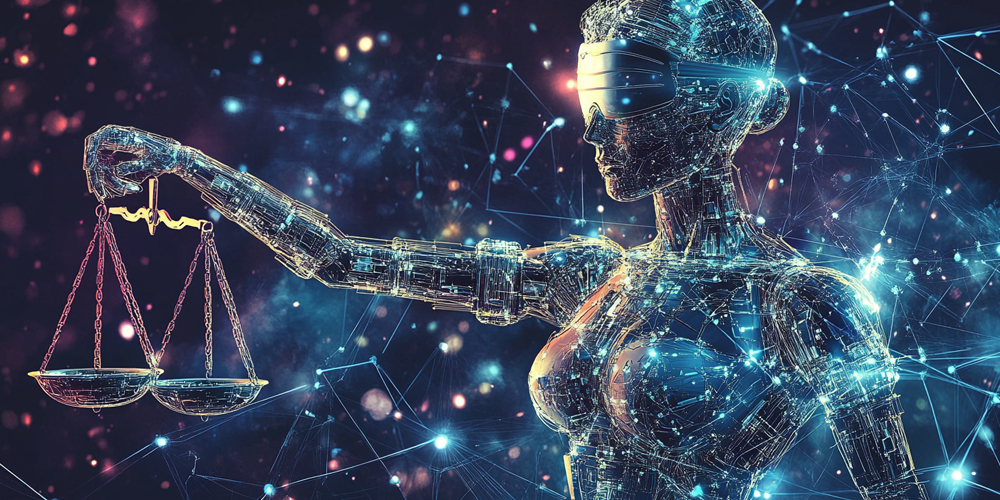Artificial intelligence (AI) has revolutionized various sectors, from healthcare to finance, offering new opportunities for efficiency and innovation. However, as AI continues to evolve, concerns about its ethical implications and the protection of personal data have become central. AI systems rely heavily on large datasets, often involving sensitive information, raising significant issues about privacy and security. This intersection between AI ethics and data privacy is vital, as both areas must work together to ensure AI benefits society without compromising individual rights. In this article, we explore the relationship between AI ethics and data privacy, the challenges they present, and solutions to address these concerns.
1. The Importance of AI Ethics
AI ethics focuses on moral considerations in the development, deployment, and use of AI technologies. These ethical principles ensure AI systems function fairly, transparently, and without harm to individuals or society. Four key principles guide AI ethics:
- Fairness: AI systems must treat all individuals equally, without introducing or perpetuating discrimination or bias.
- Accountability: Developers and organizations must be held responsible for AI decisions, especially when they affect people’s rights or well-being.
- Transparency: Organizations should explain how AI systems make decisions, particularly when those decisions impact people’s lives.
- Non-malfeasance: Developers must ensure AI systems avoid causing harm, whether physical, emotional, or societal.
As AI systems grow more sophisticated, addressing these ethical considerations becomes essential to ensure that technologies contribute positively while respecting individual rights.
2. Understanding Data Privacy in AI
Data privacy involves protecting personal information collected, stored, and processed by organizations. Since AI systems require large amounts of data to function, including sensitive personal details, privacy concerns are more critical than ever. Mishandling or unauthorized access to this data can lead to severe privacy violations such as identity theft, discrimination, or surveillance.
Key privacy concerns include:
- Data Collection: AI systems often collect personal data without explicit user consent or full transparency on how the data will be used.
- Data Storage: Storing vast amounts of data increases the risk of breaches. Poor storage practices or unauthorized access can compromise privacy.
- Data Sharing: AI systems often share data across platforms, exposing personal information to third parties without sufficient safeguards.
To maintain user trust, AI developers must ensure that personal data is handled responsibly. Implementing strict guidelines for data collection, storage, and sharing is essential to protect user privacy.

3. Key Ethical Issues at the Intersection of AI and Data Privacy
Several ethical issues arise when AI systems intersect with data privacy. Addressing these concerns is necessary for responsible AI development.
a. Informed Consent and Transparency in Data Collection
Informed consent is crucial when collecting data for AI systems. However, many applications collect data without fully explaining how it will be used. This lack of transparency is a significant ethical concern. To address this, AI developers must clearly explain what data is being collected, why it is necessary, and how it will be used.
Ensuring transparency in data collection allows users to make informed decisions about their involvement with AI technologies. Moreover, developers should prioritize clear consent processes to empower users and protect their rights.
b. Bias and Discrimination in AI Models
Bias is a well-known issue in AI, especially when AI models are trained on biased or incomplete data. AI systems are only as unbiased as the data used to train them, which can lead to unfair outcomes. For example, biased AI algorithms can negatively impact hiring practices, loan approvals, or criminal justice decisions, especially for marginalized communities.
Bias can also result from how data is collected or processed. If certain groups are underrepresented or overrepresented in the data, the resulting AI decisions could skew, leading to discrimination. Ensuring fairness in AI requires addressing these biases during both the data collection and model training stages.
By enhancing transparency in AI decision-making, developers can identify and mitigate bias. This approach allows users to understand how AI makes decisions and whether it’s fair or discriminatory.
c. Security and Protection of Personal Data
AI systems process sensitive personal data, increasing the importance of data security. Breaches or unauthorized access to personal data can result in identity theft, financial fraud, and other violations. To safeguard privacy, AI developers must implement robust security measures such as encryption and regular security audits.
Organizations must also minimize the amount of personal data they collect, ensuring only the necessary information is gathered for the AI system to function. Security protocols, including strict access controls, anonymization of data, and encryption, are essential to protect users’ privacy and data.
4. Solutions to Address AI Ethics and Data Privacy Concerns
To address the challenges at the intersection of AI ethics and data privacy, several solutions can help mitigate risks and ensure responsible use of AI.
a. Stronger Data Privacy Regulations
Governments play a crucial role in regulating data privacy. Regulations like the General Data Protection Regulation (GDPR) in the European Union set high standards for data protection, requiring organizations to obtain explicit consent from users and ensure transparency in data usage. Implementing similar regulations globally can help create consistent standards for data privacy.
Stronger regulations can establish clear rules for organizations to follow, ensuring they handle data responsibly and respect user privacy.
b. Ethical AI Frameworks and Guidelines
AI developers should adhere to established ethical frameworks to guide the design, development, and deployment of AI systems. These frameworks should prioritize privacy, fairness, and accountability. They should also include measures to ensure transparency in AI decisions and provide guidelines for responsible data collection and usage.
Ethical AI frameworks can also help organizations audit their systems regularly to identify and address potential biases or security risks.
c. User Control and Empowerment
Empowering users to control their data is another important solution. Users should be able to opt in or out of data collection and access, correct, or delete their personal information. By providing intuitive tools to manage privacy settings, organizations can give users more control over their data.
Additionally, AI systems should limit data collection to only what is necessary for the system’s functionality. This practice reduces privacy risks and ensures that individuals’ information is used for legitimate purposes only.

5. The Future of AI Ethics and Data Privacy
The relationship between AI ethics and data privacy will continue to evolve as AI technologies advance. New ethical and privacy challenges will emerge, requiring constant vigilance and adaptation. As AI systems expand into various sectors, such as healthcare, transportation, and finance, the need for strong privacy protections and ethical guidelines will increase.
AI developers, organizations, and governments must collaborate to address these challenges and ensure responsible AI deployment. In the future, AI might also enhance privacy protections through techniques like differential privacy, which allows for data analysis without compromising individual privacy. These innovations will help balance the benefits of AI with the need to safeguard personal data.
6. Conclusion
The intersection of AI ethics and data privacy is critical as AI systems become increasingly integrated into our daily lives. While AI offers many benefits, its use raises significant ethical and privacy concerns that must be addressed. By adopting strong ethical principles, enforcing strict data privacy measures, and empowering users with control over their personal data, we can ensure that AI technologies are used responsibly.
Collaboration among governments, businesses, and developers will be essential in tackling these challenges. With the right oversight and ethical frameworks, AI can contribute positively to society while respecting individual rights and privacy.




